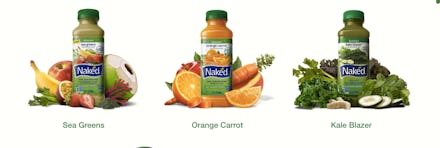Naked's "green" juice has a shit-ton of sugar, and now the company's getting sued

Have you ever slugged back a Naked Juice and thought to yourself, "Damn, it feels good to be so healthy"? Welp, while PepsiCo's Naked products are marketed as virtuous smoothies, these drinks won't necessarily help you look better in the buff.
According to a statement from the Center for Science in the Public Interest — which, along with New York law firm Reese LLP, filed a lawsuit against PepsiCo on Tuesday — Naked Juices are misleadingly marketed as "predominantly containing high-value ingredients such as acai berry, blueberries, kale and mango, when in fact the predominant ingredient in the product line is usually cheap, nutrient-poor apple juice."
Bummer, right? As CSPI points out, Naked Juice's "Kale Blazer" flavor flaunts itself as a veggie-packed elixir, while in reality, its first ingredient is orange juice, a sugary beverage that contains much less fiber than whole oranges. The third ingredient is apple juice.
Another way to look at it: According to the label, one bottle contains 5 3/4 pieces of kale and just one-eighth of a cucumber, compared to 1 3/4 oranges and three-quarters of an apple. Does this drink even deserve to have kale in its name?
"Consumers are paying higher prices for the healthful and expensive ingredients advertised on Naked labels," CSPI litigation director Maia Kats said in a statement. "But consumers are predominantly getting apple juice, or in the case of Kale Blazer, orange and apple juice. They're not getting what they paid for."
The label also reads "no sugar added," tricky language that might lead a consumer to believe that the drink is low in sugar. But a bottle of Kale Blazer contains 34 grams of sugar — seven more grams of sugar than a Snickers candy bar. So... pairing a Kale Blazer with a donut isn't much of a balanced breakfast after all.
The product's green, vibrant label doesn't register as the sugar-companion to a candy bar, does it? A 2013 study from Cornell University found that shoppers identify the color green as more healthful than other colors; It's just one of the many ways we're all being manipulated by packaging at the grocery store.
The lawsuit also condemns Naked juices for not having the phrase "not a low-calorie food" on its labels. This is a disclosure the Food and Drug Administration requires for products that, in this case, boast "no sugar added" while not meeting the FDA's qualifications for low-calorie foods.
If you squint real hard, you'll see that the label reads "Kale flavored 8 juice blend," but CSPI's lawsuit says that the bountiful images of kale camouflage this marking.
Pepsi's on the defense.
A PepsiCo spokesperson said in an email to Mic that the lawsuit "baseless," adding, "There is nothing misleading about our Naked Juice products." The spokesperson continued:
Every bottle of Naked Juice clearly identifies the fruit and vegetables that are within. For example, the label on our Kale Blazer juice accurately indicates each bottle contains 5 3/4 Kale leaves. All products in the Naked portfolio proudly use fruits and/or vegetables with no sugar added, and all Non-GMO claims on label are verified by an independent third party. Any sugar present in Naked Juice products comes from the fruits and/or vegetables contained within and the sugar content is clearly reflected on label for all consumers to see. We hold ourselves to a high standard and proudly support clear and transparent labeling of all ingredients on our packaging, on our website and in our marketing.
While Naked Juice does indeed accurately identify the ingredients in its bottles (see below), the labels have some smart marketing tactics. For example, most of the vegetable and fruit illustrations exaggerate how much of each food is in the product.
This is not the first time Naked Juice has been exposed
In 2013, PepsiCo settled a lawsuit resulting from five class action complaints filed against Naked Juice, ABC reported. According to the lawsuit, the company breached state and federal laws that protect consumers from misleading marketing and labeling. Groundhog Day, anyone?
This all matters because product labels greatly inform and persuade consumer purchasing decisions. According to the International Food Information Council's 2016 Food & Health Survey, the healthfulness of foods and drinks influenced the majority of consumers' buying decisions. Even more, a 2015 Nielsen survey revealed that shoppers are willing to spend more for products they perceive as more healthful.
Next time you're hankering for a smoothie, a little DIY might be in your best interests. Don't let a pretty green label get the best of you.